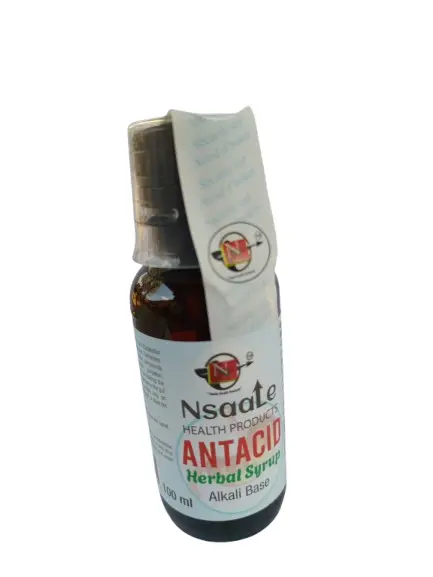Nsaale Antacid Herbal Syrup 100 ml
NDA Reg. No. THA 1340
Description:
Nsaale antacid herbal syrup is all-natural herbal extract
from Eucalyptus spp plant blends,
it has active organic compounds which
include, Phenanthrenequinone, Alpha-naphthol, Daidzein, Solasodine, Dodecanoic
acid, 6-Octadecenoic acid methyl ester, Hexadecenoic acid methyl ester, Methyl
tetradecanoate, and Methyl stearate, these bioactive organic compounds have
neutralizing properties like; antioxidation, purgation, antimicrobial, anti-inflammatory,
and laxative which work quickly by neutralizing the excess stomach acids and
breaking up extra gas bubbles in the gut that causes GERD symptoms. This
medication works on lowering hyperchlorhydria existing levels in the stomach.
It does not prevent acid production.
Indications;
Helps relieve symptoms of GERD, Stomach Ulcers, Stomach upset, heartburn, bloating, belching and Constipation.
Drug Interactions:
No adverse effects have been reported regarding the simultaneous use along with other medications. It may be used alone or with other medications that lower acid production (like H2 blockers and proton pump inhibitors).
Warnings & Precautions:
Pregnancy & Lactation
Nsaale Antacid Herbal Syrup contains all-natural formulations which are generally recognized as safe (GRAS) when administered orally. No adverse side effects have been reported by pregnant and breastfeeding individuals though they should exercise caution and take the appropriate dosage as excessive consumption can lead to toxicity and mild side effects.
Side Effects:
Over dosing may cause some angina chest pain, mild diarrhea and anaphylaxis which stop once intake is stopped. Seek medical advice and take caution if you’re allergic to Eucalyptus spp or its components.
Administration: Oral
Dosage:
Adults 20 ml & children below 12 years 5 to 10 ml before meals, twice a day or as prescribed by a physician.
Duration of Treatment:
Duration of treatment depends on the type and severity of the symptoms. Treatment should last within 1 to 14 days. Treatment should be maintained for 3-5 days after the symptoms have subsided. If symptoms persist seek medical advice.
Storage: Store below 30°C, Protect from heat and direct sunlight. Keep out of the reach of children.
Key Ingredients & Their Mechanisms of Action MoA:
- Eucalyptus spp plant blends:. Its anti-inflammatory properties contribute to soothing irritated gastrointestinal lining.
- Phenanthrenequinone:. Due to its mechanisms involving oxidative stress generation and disruption of cellular processes, its use for antimicrobial effects against certain pathogens or in targeted therapies against cancer cells. In these specific, controlled contexts, its ability to induce cell damage might be leveraged to eliminate unwanted microbial growth or abnormal cell proliferation on the gastrointestinal lining.
- Alpha-naphthol: 1-Naphthol (alpha-naphthol) is a phenolic compound that can exhibit antioxidant activity. It has been used in pharmaceutical compounds such as antiseptic medications.
- Daidzein: Daidzein exhibits anti-inflammatory effects by inhibiting the production of pro-inflammatory cytokines and enzymes such as TNF-α, IL-6, and COX-2. It also functions as a natural antioxidant, inhibiting lipid oxidation and improving the activity of anti-oxidative enzymes. These anti-inflammatory and antioxidant properties could contribute to soothing an irritated gastrointestinal tract, which is often a component of GERD and ulcers. Daidzein's anti-inflammatory properties directly address the inflammatory component of conditions like GERD and stomach ulcers. By inhibiting key pro-inflammatory mediators, it can help mitigate the discomfort and damage associated with these conditions.
- Solasodine: Solasodine has powerful anticancer properties by inducing apoptosis and cell cycle arrest in various tumor cells. It suppresses proliferation and motility of colorectal cancer cells through inhibition of the AKT/GSK-3β/β-catenin signaling pathway.
- Dodecanoic acid:. Its primary therapeutic role is antimicrobial. It can treat intestinal infections.
- 6-Octadecenoic acid methyl ester: This compound, related to oleic acid, possesses antimicrobial and antibacterial activities.
- Hexadecenoic acid methyl ester: This compound exhibits antimicrobial, antibacterial, anti-inflammatory, and antioxidant properties.
- Methyl tetradecanoate: Methyl tetradecanoate, or methyl myristate, primarily impacts gastrointestinal health indirectly. Upon ingestion, it is hydrolyzed in the gut to release methanol and tetradecanoic acid (myristic acid). The myristic acid then serves as a metabolic precursor, providing essential energy and building blocks for maintaining the health and integrity of gut epithelial cells, which are crucial for digestion and barrier function. Furthermore, the released myristic acid, and its derivative monomyristin, exhibit notable antimicrobial properties by disrupting microbial cell membranes, potentially helping to modulate the gut microbiota and inhibit the growth of undesirable bacteria and viruses, thereby contributing to a healthier gut environment.
